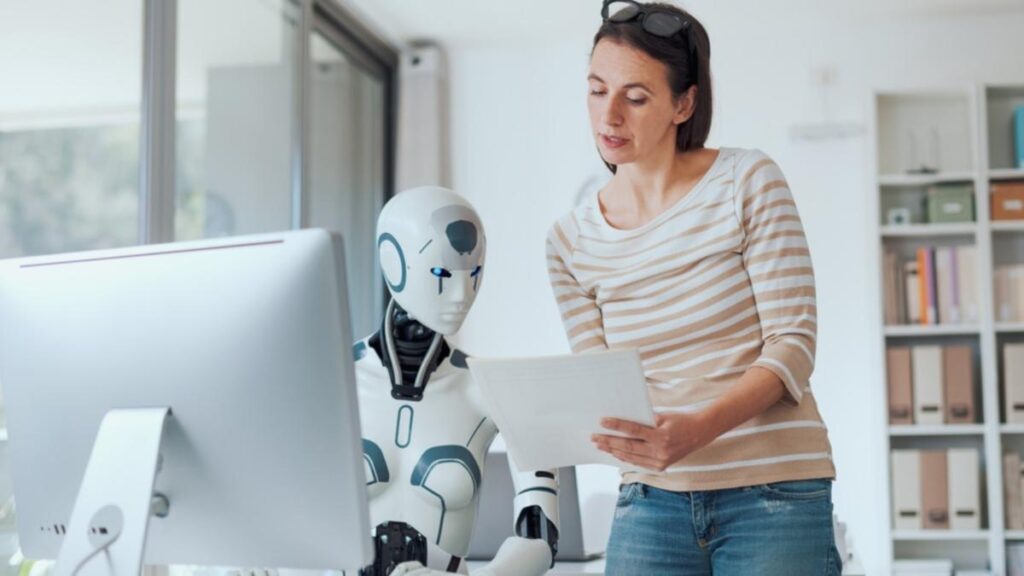The AI Revolution: A New Type of Mental Infrastructure
Sundar Pichai, Google’s CEO, recently stated that artificial intelligence (AI) is “probably the most important thing humanity has ever worked on… something deeper than electricity or fire.” The reality is that AI has become a new type of mental infrastructure. An emerging force that redefines and expands our cognitive abilities, thereby reconfiguring the very meaning of working, leading, and creating value.
The main issue is that today, in thousands of companies, there’s more AI than organizational intelligence. While many executives continue to debate whether AI is safe, employees are already using it—behind their leaders’ backs.
The Leadership Gap
According to McKinsey, 75% of employees already use some AI tools. However, more than 60% of organizations still lack a clear plan for integrating AI. More alarmingly, employees use generative AI tools three times more often than their leaders believe. Despite this spontaneous adoption, only 26% of employees have received substantial training to use AI with discernment, security, or purpose.
These numbers reveal a cultural fracture. Innovation has outpaced leadership. While teams experiment, test, and solve problems using AI—even outside the organization’s ethical framework—executive layers grapple with fascination, skepticism, and inertia.
In many Latin American companies, the conversation still revolves around whether AI is a threat to contain, a fad to observe, or a trend to wait for. What’s overlooked is that it’s no longer about whether AI will change the way we work but how we adapt to a change that’s already overtaking us.
Workers adopt AI because they need it. They use it to write faster, analyze better, gain perspective, free up time, or simply stay competitive in an unforgiving environment. It’s a matter of survival.
AI has become the silent copilot that many are unwilling to let go. The technology is ready and advancing, as are the people. What’s missing is leadership.
What Does It Mean to Work When a Machine Can Do It Better?
At stake is the place of humans in the value creation process. When an algorithm can draft a report in seconds and a predictive model can analyze more information in minutes than an entire team could in weeks, the question is no longer technical; it’s existential.
What matters more now: precision or judgment? Speed or purpose?
In this new environment, work must evolve. Its center of gravity shifts. It compels us to rethink the essence of our contribution. The human differentiator is no longer necessarily in execution, as it makes no sense anymore; it’s more than ever in discernment and judgment. It lies in the ability to imagine, to imbue meaning.
The answer is to redesign work based on what AI lacks: history, context, body, ethics, courage. We cannot lead from fear or improvisation. We must design a new collaboration between human capabilities and artificial intelligence.
Leading AI requires much more than enabling technology: It urgently demands training discernment.
The only real threat AI poses in this context is its irresponsible implementation. An AI deployed without training, conversation, or principles is a source of fragmentation and errors. We can’t keep reducing its integration to inspiring slogans or cosmetic solutions. Nor can we hide it under the technical jargon of restrictive policies that nobody enforces.
What’s needed is a mature, cross-cutting, and sustained conversation to eliminate anxiety and improvisation, designing a strategic governance of AI-powered teams.
This conversation should start with tough questions:
- Which tasks should we automate to free human capacity?
- What decisions should never be left to AI, under any circumstances?
- What ethical risks are we willing to accept and how do we mitigate them?
- What skills does our team need to collaborate with AI without losing discernment or autonomy?
- What data do we protect, why, and how do we ensure this protection?
- Most importantly, how do we preserve and enhance the best of humanity in this transition?
We’re Facing a Cultural Transformation
Most people don’t fear AI; they fear their organization will implement it poorly and fall behind.
According to a survey, 71% of employees trust their companies more than governments or big tech to implement AI ethically.
This presents a historic opportunity to create evolutive organizations, more aware of complexity and positive towards people.
AI isn’t here to take your job; it’s asking if you’re ready to reinvent it.






